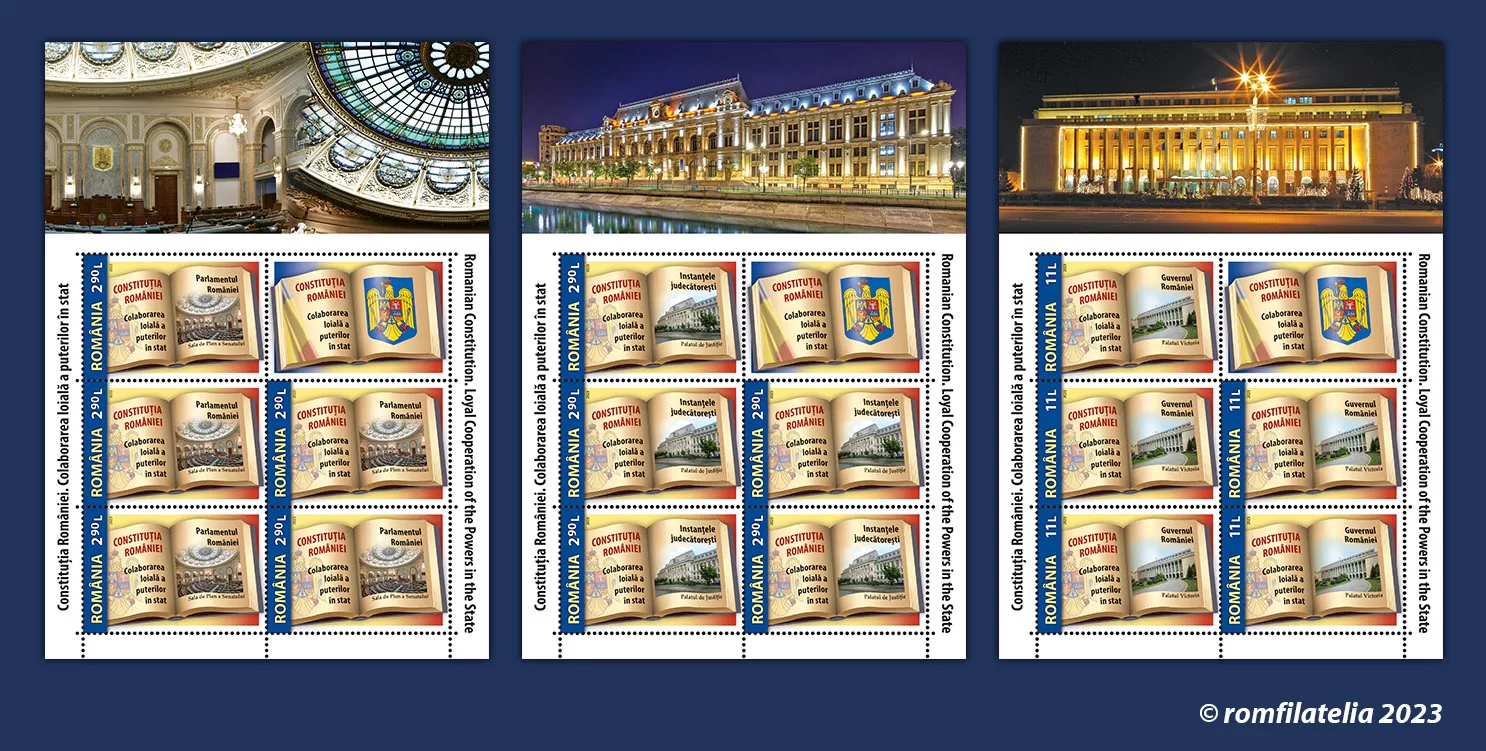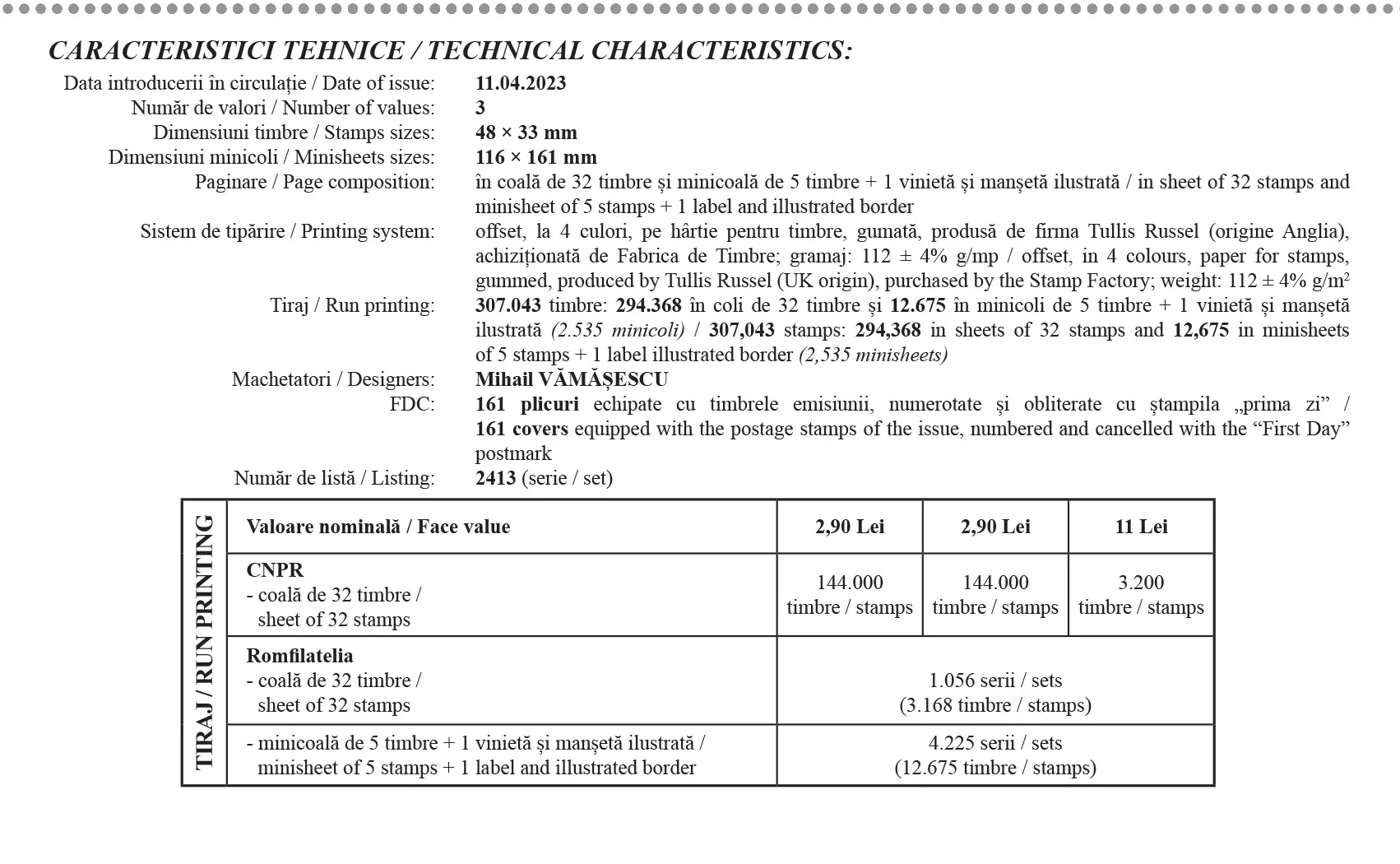 Romfilatelia introduces circulation on Tuesday, April 11, a.c. the issue of postage stamps Constitution of Romania. Loyal Collaboration of the Powers in the State, consisting of 3 stamps, 3 minisheets of 5 postage stamps + 1 label and illustrated border and a First Day Cover.
Romfilatelia introduces circulation on Tuesday, April 11, a.c. the issue of postage stamps Constitution of Romania. Loyal Collaboration of the Powers in the State, consisting of 3 stamps, 3 minisheets of 5 postage stamps + 1 label and illustrated border and a First Day Cover.
The Plenary Hall of the Romanian Senate is illustrated on the postage stamp with the face value of Lei 2.90 lei.
The postage stamp with the face value of Lei 2.90 depicts the architecture of the Palace of Justice building, and the postage stamp with the face value of Lei 11 illustrates the architecture of the main façade of the Victoria Palace, the headquarters of the Romanian Government.
Parliament of Romania
In a state governed by the rule of law, Parliament expresses the essence of democracy and has the role of legitimately expressing the political will and general interests of the nation in the most important areas of social life. Through Parliament, the nation expresses its consent to be governed by representative bodies. For the nation, Parliament is the most important political institution, the repository of its sovereign will. Parliament consists of the Chamber of Deputies and the Senate and is established by free elections based on universal, equal, direct and secret suffrage for a four-year mandate.
The Constitution states in article 61 para. (1) that “Parliament is the supreme representative body of the Romanian people and the sole legislative authority of the country”. Its status of sole legislative authority of the country confers on Parliament the exclusive power to give the general will of the people a normative form and content. Only Parliament has the right to adopt laws, which can be constitutional, organic or ordinary. As the laws adopted by Parliament are the expression of the people’s will, they are binding on all the citizens of the country.
In exercising its constitutional role, the Parliament enjoys, according to the Constitution, organisational, functional and financial autonomy, each legislative Chamber establishing its own rules of organisation and functioning.
Courts of law
In Romania, justice is rendered by the High Court of Cassation and Justice and the other courts of law set up by the law. The administration of justice is achieved through a complex set of legal rules that regulate the organisation of the judiciary, establish the jurisdiction of the courts and set the framework for the conduct of judicial activity. The Constitution states in article 124 that justice shall be rendered in the name of the law and that it shall be one, impartial, and equal for all. A fundamental principle of the administration of justice, expressly provided for in the Constitution, is the independence of judges in their judicial activity, subject only to the laws.
In order to ensure a fair trial and the exercise of the right of defence, the prosecutor and the lawyer participate in the trial, in addition to the judges.
The courts of law are organised in a hierarchical system, headed by the High Court of Cassation and Justice as the highest court of the judiciary. In addition to this and on a lower hierarchical scale, courts of appeal, tribunals and courts operate. According to article 126 para. (5) of the fundamental Law, the Parliament may set up by means of an organic law courts of law specialized in certain matters. However, it is prohibited to establish extraordinary courts of law.
The role of the High Court of Cassation and Justice is to ensure the unitary interpretation and implementation of laws by all other courts of law.
Government of Romania
The reason for being of any Government and its primary mission is the immediate and effective implementation of the laws voted by Parliament and promulgated by the Head of State. In the Romanian constitutional system, the Government is formed as an effect of the political will of the Parliament and on the basis of the government programme, which contains the general directions and sources of the economic and social development of the State. The Government consists of the Prime Minister, ministers and other members established by organic law.
The Constitution states in article 102 para. (1) that “The Government shall, in accordance with its government programme accepted by Parliament, ensure the implementation of the domestic and foreign policy of the country, and exercise the general management of public administration”. Parliament’s acceptance of the government programme gives the legislature the right to exercise political control over the Government for its entire activity and over each of its members, who are politically accountable jointly and severally with the other members for the Government’s overall activity and its acts. In carrying out its constitutional mission and duties, the Government enjoys full autonomy, but under parliamentary control.
Romfilatelia thanks the representatives of the Senate of Romania for cooperation and photographic support and Mr. professor Cristian Ionescu for the documentary support granted to the development of this issue of postage stamps.









